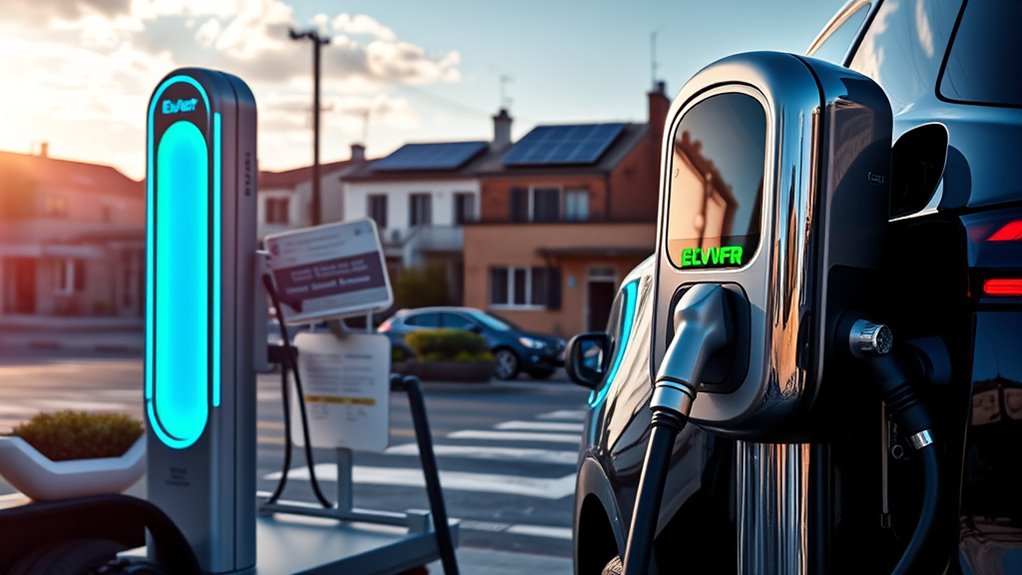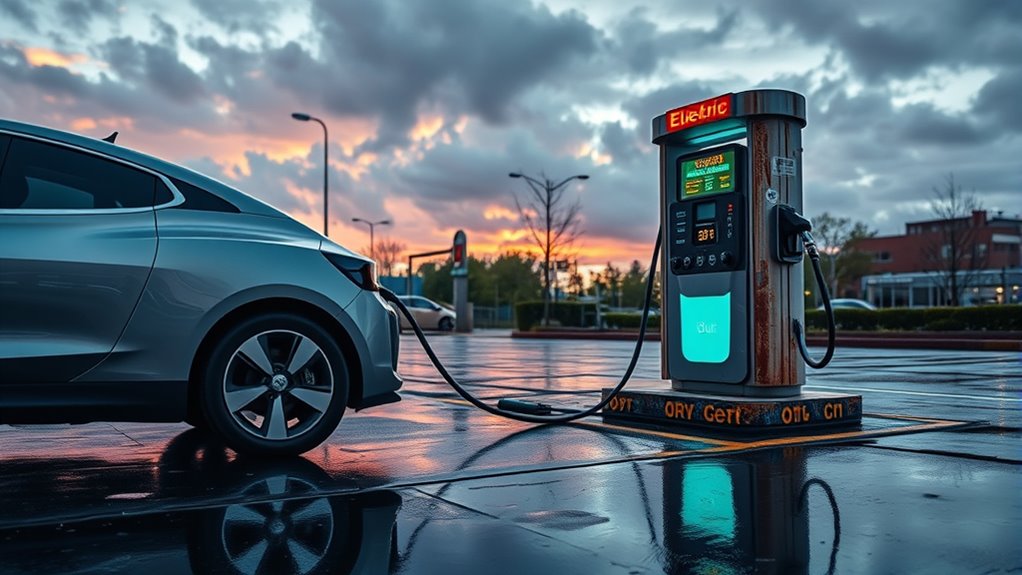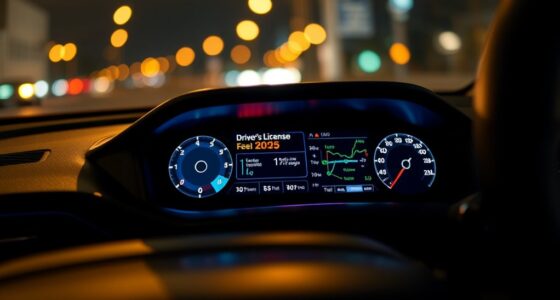In 2025, charging your electric vehicle will likely cost you less than fueling a gasoline car. With average monthly EV charging expenses around $67 to $70, compared to $113 to $158 for gas, you’ll save over $87 each month. Better efficiency, declining energy costs, and improvements in charging technology make EVs more economical long-term. Stick with us to discover more about how these savings happen and what influences your overall costs.
Key Takeaways
- EV charging costs in 2025 are projected to be significantly lower than gasoline expenses for the same distance.
- Home charging at ~$0.17 per kWh offers greater savings compared to public fast chargers and gasoline.
- Total monthly costs for EVs, including maintenance, are expected to be more economical than gasoline vehicles.
- Gasoline prices are more volatile, whereas electricity rates are likely to remain stable and potentially decrease.
- Overall, EV charging will be cheaper than gasoline for most drivers by 2025, driven by technological advances and energy trends.

Are you wondering whether electric vehicle (EV) charging is truly cheaper than fueling with gasoline? The answer depends on several factors, including advances in battery technology and the availability of charging infrastructure. In 2025, the gap between EV charging costs and gasoline expenses continues to widen, making EVs an increasingly economical choice for many drivers. On average, monthly EV charging costs hover around $67 to $70, while gasoline costs for a comparable distance range from $113 to $158. That means potential savings of over $87 to more than $100 each month, depending on your local gas prices and electricity rates. For example, if you drive about 1,015 miles a month, you’ll use roughly 338 kWh of electricity at about $0.17 per kWh, totaling approximately $59 in charging costs. In contrast, fueling a gasoline car with 30 mpg efficiency would require about 34 gallons, costing between $113 and $158. Electricity prices tend to be more stable and predictable than volatile gas prices, making it easier to budget for EV ownership. Stable electricity rates also contribute to more predictable monthly expenses, further emphasizing the cost advantage of EVs over traditional gasoline vehicles.
Your charging location considerably impacts costs. Charging at home is substantially cheaper—averaging around $0.17 per kWh—compared to public DC fast charging stations, which can charge around $0.50 per kWh. Using fast chargers for the same 338 kWh energy requirement could cost around $169 monthly, surpassing typical gasoline expenses. Regional differences in electricity prices also play a role; even in states with higher residential rates, EVs often remain more economical because gas prices are typically higher there as well. The key to maximizing savings is having access to a reliable charging infrastructure at home. With tools like PlugShare, you can find affordable public chargers, but relying on public fast charging may diminish some of your savings.
Home charging is most cost-effective; public fast chargers can significantly increase your expenses.
Battery technology advancements have increased EV efficiency, converting roughly 85-90% of electrical energy into movement, compared to just 20-30% for internal combustion engines. This higher energy efficiency means lower costs per mile. As battery technology continues to improve, expect even better range and charging efficiency, reducing the frequency and cost of charging. The increased range reduces the need for frequent stops, further lowering daily operating costs. While EVs tend to have higher insurance premiums—about $44 more per month—they benefit from lower maintenance costs because they have fewer mechanical parts and don’t require oil changes. Although EV resale values are still evolving, they are improving, especially for popular models, helping offset initial costs. Government incentives and tax credits also help reduce the upfront purchase price, making EVs more affordable overall.
Looking ahead, as electricity generation shifts toward renewable sources, charging costs are projected to decrease further. Meanwhile, gasoline prices remain vulnerable to global oil market fluctuations and geopolitical risks. With these factors combined, EV charging in 2025 is set to be markedly cheaper than fueling with gasoline for most drivers, especially when considering the long-term savings and environmental benefits.
Frequently Asked Questions
How Will Government Incentives Impact EV and Gasoline Costs in 2025?
Government incentives like tax incentives and subsidies will substantially lower your EV purchase costs in 2025, making them more competitive with gasoline vehicles. These subsidies help reduce upfront expenses, while ongoing incentives lower fuel and maintenance costs. As a result, you’ll likely see a more balanced cost comparison, with EVs becoming a more affordable and attractive option, especially as incentives expand and evolve to support cleaner transportation choices.
What Are the Long-Term Maintenance Costs for EVS Versus Gasoline Cars?
Imagine saving around $4,600 over your vehicle’s lifetime—long-term maintenance costs favor EVs. You’ll spend less on repairs thanks to fewer moving parts and simpler systems. Battery longevity reduces replacement worries, and repair costs stay predictable. Compared to gasoline cars, EVs cost about $1,464 less annually for maintenance. So, over time, EVs offer lower, more manageable maintenance expenses, making them a smarter, cost-effective choice for the long run.
How Will Energy Grid Changes Influence EV Charging Prices?
You’ll notice that energy grid changes, like renewable integration and smart grids, will influence EV charging prices by making them more dynamic and potentially lower. Smart grid technology allows for better load management, shifting charging to off-peak times, which cuts costs. Renewable integration supplies cleaner energy at lower prices, while smart grids help balance demand, preventing costly upgrades and ultimately making charging more affordable for you in 2025.
Are There Regional Differences in EV Charging and Gasoline Expenses?
Imagine driving through vibrant cities and quiet rural roads—your expenses reflecting regional disparities. Fuel price variations and electricity costs fluctuate sharply across states, making your charging or fueling costs feel like a roller coaster. In some areas, high electricity rates and taxes bump up EV charging expenses, while fuel prices vary with regional market shifts. These regional disparities directly impact what you pay, shaping your overall transportation costs in ways you can’t ignore.
How Do Future Technological Advancements Affect Affordability Comparisons?
Future technological advancements like improved battery storage and renewable energy integration will make charging your EV more affordable. As battery technology gets better, you’ll benefit from longer-lasting batteries and lower costs. Renewable energy sources will help stabilize or reduce electricity prices, saving you even more. These innovations will likely lower overall costs, making EVs a more economical choice compared to gasoline vehicles, especially as adoption increases and infrastructure expands.
Conclusion
So, in 2025, as you ponder whether to fill up your tank or plug in your car, remember: one option promises lower costs, while the other offers endless fuel for your impatience. Sure, EVs might save you a few bucks and the planet, but who needs savings when you can enjoy the thrill of watching your gas gauge slowly drain? Ultimately, it’s all about choosing the cheaper option—unless you’re just in it for the adventure of high expenses.










